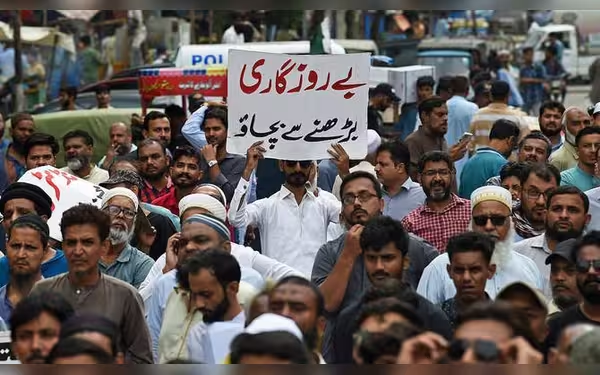Saturday, November 16, 2024 07:53 PM
Youth Unemployment Crisis in Pakistan: Urgent Reforms Needed
- Over 60% of Pakistan's population is under 30.
- 40% of graduates struggle to find suitable jobs.
- Government and private sector must collaborate for solutions.
 Image Credits: thefridaytimes
Image Credits: thefridaytimesPakistan faces a youth unemployment crisis, with urgent reforms needed in education and job creation to harness the potential of its young population.
Pakistan is home to one of the youngest populations in the world, with over 60% of its citizens under the age of 30. However, this youthful demographic faces a significant challenge: a lack of job opportunities. Many young people, despite having higher education, find themselves struggling to secure meaningful employment. This issue is compounded by an education system that prioritizes theoretical knowledge over practical skills, leaving graduates feeling frustrated and underprepared for the job market.
The education system in Pakistan is in urgent need of reform. Academic institutions churn out thousands of graduates each year, but the focus remains largely on theory. This approach fails to equip students with the hands-on experience necessary for practical fields such as technology, healthcare, and engineering. Recent surveys indicate that nearly 40% of recent graduates encounter difficulties in finding jobs that match their qualifications, primarily due to a mismatch between their skills and the demands of the job market.
Moreover, many students graduate with degrees in fields that do not align with current industry trends. For instance, those studying humanities and social sciences often struggle to find stable employment, while graduates in more technical fields may lack the practical experience that employers seek. This disconnect not only affects the economic prospects of young individuals but also takes a toll on their mental well-being. In a society where higher education is viewed as a pathway to success, the inability to secure a job can lead to feelings of wasted potential.
The issue of youth unemployment is further exacerbated by the phenomenon of brain drain, where educated young adults seek better opportunities abroad. This migration not only deprives Pakistan of its talented workforce but also intensifies the challenges of unemployment and underemployment at home. While the education system and government policies are crucial in addressing this crisis, the private sector also has a significant role to play.
Many private companies are beginning to recognize the importance of investing in a skilled workforce. Initiatives such as internship programs and training initiatives are being implemented to bridge the gap between education and employment. For example, companies like Netsol Technologies and Systems Limited offer long-standing internship programs that provide graduates with valuable practical experience and industry connections. By collaborating with educational institutions, businesses can ensure that the skills they require are integrated into the curriculum.
Government intervention is also essential in tackling the youth employment crisis. Policies that promote entrepreneurship and self-employment can create new opportunities for young people. The "Kamyab Jawan" program, launched in 2022, is one such initiative that provides subsidized financing and training for young entrepreneurs. Additionally, vocational training and skill development programs should be expanded, particularly for those who may not have the means to pursue traditional higher education.
In recent years, organizations like the National Vocational and Technical Training Commission (NAVTTC) have made strides in offering courses in high-demand sectors such as construction, manufacturing, and agriculture. However, these programs must be enhanced and aligned with industry needs to ensure their effectiveness. Furthermore, the government should incentivize industries to hire more young workers by offering tax breaks or subsidies to companies that invest in training graduates.
To effectively address the youth unemployment crisis, a comprehensive strategy is required. First, the education system must be restructured to emphasize practical skills, particularly in technology, healthcare, engineering, and entrepreneurship. Integrating internships and hands-on training into university curricula can better prepare graduates for the workforce. Second, the private sector must actively create opportunities for young people to gain relevant work experience, ensuring that job placements align with industry requirements. Lastly, government policies should foster an environment conducive to entrepreneurship, vocational training, and innovation.
Investing in youth employment is not merely a moral obligation; it is an economic necessity. By equipping young people with the skills they need to succeed, Pakistan can harness the potential of its youthful population and pave the way for a brighter future. The time to act is now, as the future of the nation depends on the success of its youth.













